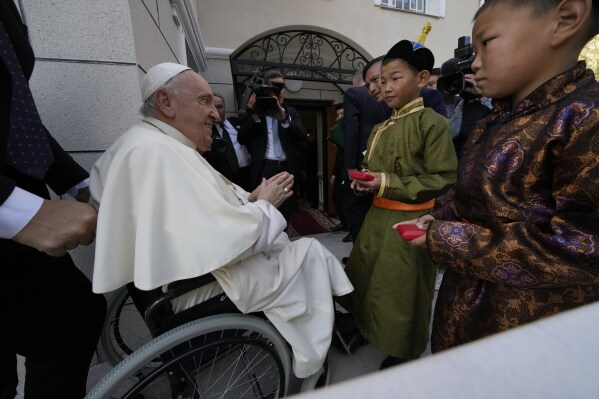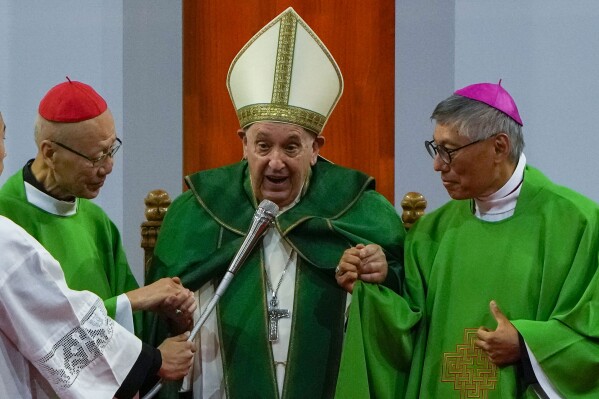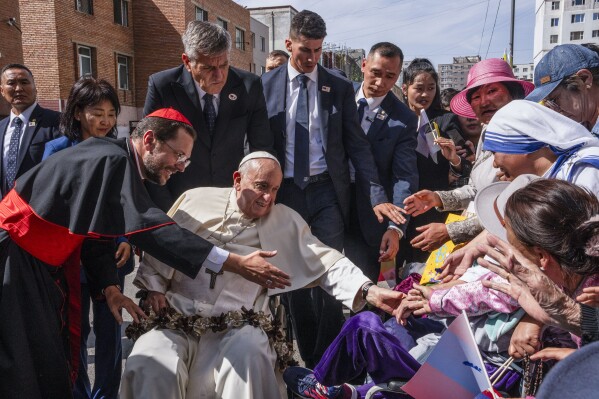2023/09/03

By Philip Pullella
ULAANBAATAR (Reuters) -In an unprecedented event, Pope Francis and just about the entire Catholic population of a country were in the same room when he presided at a Mass in Mongolia's capital on Sunday.
The Mass in Ulaanbaatar's Steppe Arena was the religious highlight of the pope's trip to visit the Catholic community of just 1,450. Most of Mongolia's population of about 3.3 million are Buddhists.
Most of Mongolia's nine parishes are in the capital, but one in a remote area has only about 30 members and Church officials said they expected everyone who could make it to attend.
Many Mongolians still live a nomadic tradition to graze their animals and in his homily, the pope used the image to make his point.
"All of us are God's nomads, pilgrims in search of happiness, wayfarers thirsting for love," he said, adding that the Christian faith quenched that thirst.
Several Buddhist monks in their saffron robes attended the Mass, which was conducted in Mongolian, English and Italian.
Francis, who leaves for Rome on Monday after inaugurating a Church charity and health centre, began his day at an inter-religious service where he called himself one of the "humble heirs" of ancient schools of wisdom and quoted the Buddha.
There, sharing a theatre stage with a dozen other religious representatives, he urged all religions to live in harmony and shun ideological fundamentalism that foments violence.
Since he started the trip, Francis has praised religious freedom in Mongolia. The landlocked country borders China, which human rights groups say represses religious freedom.
In unscripted comments at the end of the Mass, the pope sent greetings to China, making another overture to the communist country to ease restrictions on religion.
'ANCIENT SCHOOLS OF WISDOM'
The inter-religious meeting was attended by leaders representing Mongolian Buddhists, Muslims, Jews, evangelical and Orthodox Christians, Mormons, Hindus, Shintos, Bahais and shamans.
"Brothers and sisters, today we are meeting together as the humble heirs of ancient schools of wisdom. In our encounter with one another, we want to share the great treasure we have received, for the sake of enriching a humanity so often led astray on its journey by the myopic pursuit of profit and material comfort," he said.
Francis, 86, quoted from a writings of the Buddha that says "the wise man rejoices in giving", noting it was similar to Jesus' saying "It is more blessed to give than to receive".
Conservative Catholics, such as Bishop Athanasius Schneider of Kazakhstan, have lambasted the pope for attending such gatherings, calling them "a supermarket of religions" that diminishes the status of the Catholic Church.
But the pope repeated that he put great importance in "ecumenical, inter-religious and cultural dialogue". He said dialogue did not mean "to gloss over difference" but to seek understanding and enrichment.
He condemned "narrowness, unilateral imposition, fundamentalism and ideological constraint", saying they destroy fraternity, fuel tensions and compromise peace.
"There can be no mixing, then, of religious beliefs and violence, of holiness and oppression, of religious traditions and sectarianism," Francis said.
"This is a very important, meaningful meeting," said one of the attendees, Buddhist Monk Altankhuu Tserenjav of the Zuun Khuree Dashichoiling Monastery in Ulaanbaatar.
"He is a religious leader of the world, for us like a Dalai Lama, so I really respect and welcome him," he said.
Mongolia has seen a revival of Tibetan Buddhism since the collapse of the Soviet-backed Communist government in 1990, and the Dalai Lama is regarded as its main spiritual leader.
However, China has repeatedly put pressure on Mongolia not to allow the 88-year-old exiled Tibetan leader to visit, branding him a dangerous separatist.
(Reporting by Philip PullellaEditing by Lincoln Feast, Edwina Gibbs, William Mallard and Frances Kerry)




© Reuters
GENGIS KHAN HAD SLAVES
Pope starts Mongolia visit by praising the country’s religious freedom dating back to Genghis Khan
BY NICOLE WINFIELD AND SARUUL ENKHBOLD
September 2, 2023
ULAANBAATAR, Mongolia (AP) — Pope Francis on Saturday praised Mongolia’s tradition of religious freedom dating to the times of its founder, Genghis Khan, as he opened the first-ever papal visit to the Asian nation with a word of encouragement to its tiny Catholic flock.
Francis met with President Ukhnaagiin Khurelsukh inside a traditional Mongolian ger, or round yurt, set up inside the state palace and wrote a message in the guest book that he was visiting “a country young and ancient, modern and rich of tradition,” as a pilgrim of peace.
Francis is in Mongolia to minister to one of the world’s newest and smallest Catholic communities — around 1,450 Mongolians are Catholic — and make a diplomatic foray into a region where the Holy See has long had troubled relations, with Russia to the north and China to the south.
While Christianity has been present in the region for hundreds of years, the Catholic Church has only had a sanctioned presence in Mongolia since 1992, after the country abandoned its Soviet-allied communist government and enshrined religious freedom in its constitution.



While Catholicism is tolerated and legal, foreign missionaries working here lament that the government restricts their numbers and treats the church as a nongovernmental organization — limitations that the Holy See is hoping will be lifted with a comprehensive bilateral agreement.
In his remarks, Francis praised Mongolia’s tradition of religious liberty, noting that such tolerance existed even during the period of the Mongol Empire’s vast expansion over much of the world. At its height, the empire stretched as far west as Hungary to become the largest contiguous land empire in world history.
Nowadays, the landlocked nation sandwiched between Russia and China is overwhelmingly Buddhist, with traditional links to Tibet’s leading lamas, including the Dalai Lama.
“The fact that the empire could embrace such distant and varied lands over the centuries bears witness to the remarkable ability of your ancestors to acknowledge the outstanding qualities of the peoples present in its immense territory and to put those qualities at the service of a common development,” Francis told the president, diplomats and cultural leaders in remarks at the state palace.
“This model should be valued and reproposed in our own day,” he said.
Referring to the 13th-century period of relative political stability within the Mongol Empire that allowed trade and travel to flourish, Francis called for such a period of fraternity and peace to take root today and spread peace throughout the region.
“May heaven grant that today, on this earth devastated by countless conflicts, there be a renewal, respectful of international laws, of the condition of what was once the pax mongolica, that is the absence of conflicts,” he said.
Khurelsukh also referred to the “pax mongolica” in his remarks, saying that same spirit still guides Mongolia’s efforts to be a peaceful, multilateral player on the world stage.
“Achievements of pax mongolica have created the solid grounds for the development of mutual respect between different nations of the world, cherishing each other’s values and identities, enabling peaceful coexistence of various civilizations,” he said.
Later in the day, Francis met with bishops and the missionaries who have cultivated the Catholic faith here for the past three decades, presiding over a prayer in the ger-shaped St. Peter and Paul cathedral in the capital, Ulaanbaatar. On the altar sat a delicate wooden statue of the Madonna, which was found by a Mongolese woman in a landfill and now is a symbol of the church in the country.
As Francis entered and blessed the crowd with holy water, he was met with shouts of “Viva il Papa!” inside and out of the cathedral, where an estimated 2,000 people gathered.
Francis sought to encourage the missionaries, telling them not to be concerned by their “small numbers, limited successes or apparent irrelevance.” Rather, he urged them to be close to their Mongolian flocks, learn their language and love their culture.
“May you find refreshment, knowing that being little is not a problem but a resource,” he said. “God loves littleness, and through it he loves to accomplish great things.”
In the pews was one of the two Mongolese priests who have been ordained, the Rev. Peter Sanjaajav, who got a rousing applause from the crowd when he addressed Francis in Mongolian.
“Many thanks for coming to Mongolia, and for visiting our Church. Your visit makes us particularly happy,” he said.
Another Mongolian woman who converted, Rufina Chamingerel, told Francis she had spent 14 years learning her Catholic faith, to which she converted as a student. Addressing Francis in Italian, she acknowledged the Mongolian church is young and small.
“Our Church is in that phase typical of children who constantly ask their parents questions,” she said.
In his remarks to government authorities, Francis also praised Mongolia’s efforts to care for the environment. The vast, landlocked country, historically afflicted by weather extremes, is considered to be one of the countries most affected by climate change. The country has already experienced a 2.1-degree Celsius (3.8-degree Fahrenheit) increase in average temperatures over the past 70 years, and an estimated 77% of its land is degraded because of overgrazing and climate change, according to the U.N. Development Program.
Mongolia is set to host the 2026 U.N. conference on desertification and has launched a campaign to plant 1 billion trees across its vast steppes and mountains of grasslands
The pope, however, noted the need to combat “the insidious threat of corruption,” an apparent reference to a scandal over Mongolia’s trade with China over the alleged theft of 385,000 tons of coal. In December, hundreds of people braved freezing cold temperatures in the capital to protest the scandal.
“Corruption is the fruit of a utilitarian and unscrupulous mentality that has impoverished whole countries,” he said.
The Mongolian government has declared 2023 to be an “anti-corruption year” and says it is carrying out a five-part plan based on Transparency International, the global anti-graft watchdog that ranked Mongolia 116th last year in its corruption perceptions index.
Mongolians Catholic and not welcomed Francis’ visit, saying it was a sign of Mongolia’s prominence on the world stage.
“The visit of Roman pope is the proof that Mongolians are peace loving, mindful and spiritual nation,” said Chinbat Gantulga, a Mongolian engineer.“It also shows that Mongolia has a religious freedom, and respect of spiritual beliefs of anyone.”
___
Zhang Weiqun contributed to this report.
___
Associated Press religion coverage receives support through the AP’s collaboration with The Conversation US, with funding from Lilly Endowment Inc. The AP is solely responsible for this content.
Pope starts Mongolia visit by praising the country’s religious freedom dating back to Genghis Khan
BY NICOLE WINFIELD AND SARUUL ENKHBOLD
September 2, 2023
ULAANBAATAR, Mongolia (AP) — Pope Francis on Saturday praised Mongolia’s tradition of religious freedom dating to the times of its founder, Genghis Khan, as he opened the first-ever papal visit to the Asian nation with a word of encouragement to its tiny Catholic flock.
Francis met with President Ukhnaagiin Khurelsukh inside a traditional Mongolian ger, or round yurt, set up inside the state palace and wrote a message in the guest book that he was visiting “a country young and ancient, modern and rich of tradition,” as a pilgrim of peace.
Francis is in Mongolia to minister to one of the world’s newest and smallest Catholic communities — around 1,450 Mongolians are Catholic — and make a diplomatic foray into a region where the Holy See has long had troubled relations, with Russia to the north and China to the south.
While Christianity has been present in the region for hundreds of years, the Catholic Church has only had a sanctioned presence in Mongolia since 1992, after the country abandoned its Soviet-allied communist government and enshrined religious freedom in its constitution.
While Catholicism is tolerated and legal, foreign missionaries working here lament that the government restricts their numbers and treats the church as a nongovernmental organization — limitations that the Holy See is hoping will be lifted with a comprehensive bilateral agreement.
In his remarks, Francis praised Mongolia’s tradition of religious liberty, noting that such tolerance existed even during the period of the Mongol Empire’s vast expansion over much of the world. At its height, the empire stretched as far west as Hungary to become the largest contiguous land empire in world history.
Nowadays, the landlocked nation sandwiched between Russia and China is overwhelmingly Buddhist, with traditional links to Tibet’s leading lamas, including the Dalai Lama.
“The fact that the empire could embrace such distant and varied lands over the centuries bears witness to the remarkable ability of your ancestors to acknowledge the outstanding qualities of the peoples present in its immense territory and to put those qualities at the service of a common development,” Francis told the president, diplomats and cultural leaders in remarks at the state palace.
“This model should be valued and reproposed in our own day,” he said.
Referring to the 13th-century period of relative political stability within the Mongol Empire that allowed trade and travel to flourish, Francis called for such a period of fraternity and peace to take root today and spread peace throughout the region.
“May heaven grant that today, on this earth devastated by countless conflicts, there be a renewal, respectful of international laws, of the condition of what was once the pax mongolica, that is the absence of conflicts,” he said.
Khurelsukh also referred to the “pax mongolica” in his remarks, saying that same spirit still guides Mongolia’s efforts to be a peaceful, multilateral player on the world stage.
“Achievements of pax mongolica have created the solid grounds for the development of mutual respect between different nations of the world, cherishing each other’s values and identities, enabling peaceful coexistence of various civilizations,” he said.
Later in the day, Francis met with bishops and the missionaries who have cultivated the Catholic faith here for the past three decades, presiding over a prayer in the ger-shaped St. Peter and Paul cathedral in the capital, Ulaanbaatar. On the altar sat a delicate wooden statue of the Madonna, which was found by a Mongolese woman in a landfill and now is a symbol of the church in the country.
As Francis entered and blessed the crowd with holy water, he was met with shouts of “Viva il Papa!” inside and out of the cathedral, where an estimated 2,000 people gathered.
Francis sought to encourage the missionaries, telling them not to be concerned by their “small numbers, limited successes or apparent irrelevance.” Rather, he urged them to be close to their Mongolian flocks, learn their language and love their culture.
“May you find refreshment, knowing that being little is not a problem but a resource,” he said. “God loves littleness, and through it he loves to accomplish great things.”
In the pews was one of the two Mongolese priests who have been ordained, the Rev. Peter Sanjaajav, who got a rousing applause from the crowd when he addressed Francis in Mongolian.
“Many thanks for coming to Mongolia, and for visiting our Church. Your visit makes us particularly happy,” he said.
Another Mongolian woman who converted, Rufina Chamingerel, told Francis she had spent 14 years learning her Catholic faith, to which she converted as a student. Addressing Francis in Italian, she acknowledged the Mongolian church is young and small.
“Our Church is in that phase typical of children who constantly ask their parents questions,” she said.
In his remarks to government authorities, Francis also praised Mongolia’s efforts to care for the environment. The vast, landlocked country, historically afflicted by weather extremes, is considered to be one of the countries most affected by climate change. The country has already experienced a 2.1-degree Celsius (3.8-degree Fahrenheit) increase in average temperatures over the past 70 years, and an estimated 77% of its land is degraded because of overgrazing and climate change, according to the U.N. Development Program.
Mongolia is set to host the 2026 U.N. conference on desertification and has launched a campaign to plant 1 billion trees across its vast steppes and mountains of grasslands
The pope, however, noted the need to combat “the insidious threat of corruption,” an apparent reference to a scandal over Mongolia’s trade with China over the alleged theft of 385,000 tons of coal. In December, hundreds of people braved freezing cold temperatures in the capital to protest the scandal.
“Corruption is the fruit of a utilitarian and unscrupulous mentality that has impoverished whole countries,” he said.
The Mongolian government has declared 2023 to be an “anti-corruption year” and says it is carrying out a five-part plan based on Transparency International, the global anti-graft watchdog that ranked Mongolia 116th last year in its corruption perceptions index.
Mongolians Catholic and not welcomed Francis’ visit, saying it was a sign of Mongolia’s prominence on the world stage.
“The visit of Roman pope is the proof that Mongolians are peace loving, mindful and spiritual nation,” said Chinbat Gantulga, a Mongolian engineer.“It also shows that Mongolia has a religious freedom, and respect of spiritual beliefs of anyone.”
___
Zhang Weiqun contributed to this report.
___
Associated Press religion coverage receives support through the AP’s collaboration with The Conversation US, with funding from Lilly Endowment Inc. The AP is solely responsible for this content.
No comments:
Post a Comment